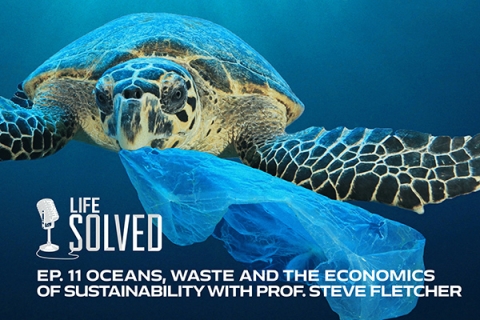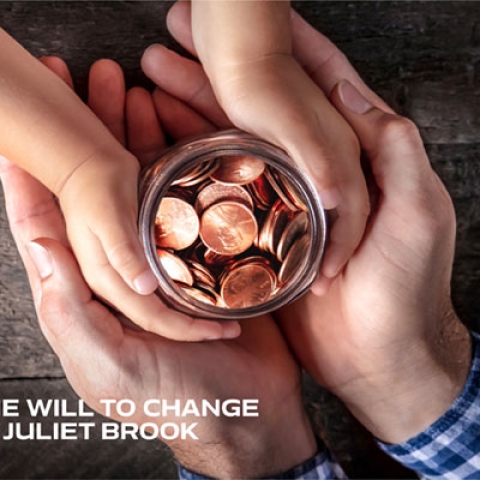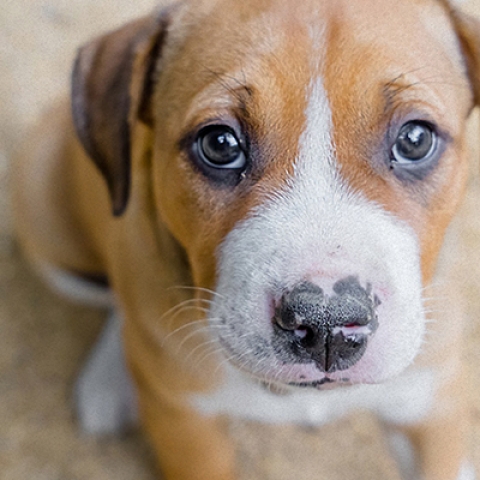

Portsmouth researchers discuss plastic waste and the economics of sustainability
37 min listen
Welcome to Life Solved Series 2, featuring ideas and research changing our understanding of human relationships and environments.
In this special episode, John Worsey chairs two discussions exploring the world's plastic pollution problem and how this might challenge enzyme technology that's developing here at Portsmouth.
Learn about how developing nations are outstripping the developed world in adopting innovative environmental collaborations in government. And hear how everyday infrastructure, such as wastewater systems, might embrace technology to make our lives cleaner, safer and less destructive to environments.
You'll hear from:
- Professor John McGeehan on innovation using plastic-eating enzymes,
- Professor Steve Fletcher on how economic policy around ocean resources can improve sustainability,
- Professor John Williams on the challenges and opportunities to revolutionising wastewater infrastructure for sustainable living,
- Professor Pierre Failler on how to manage natural resources to give value to our economy.
You can listen to Life Solved on all major podcast players, whether via Apple, Spotify, Google Podcasts or other apps. Just search for 'Life Solved' and press the subscribe button.
If people started to think about the infrastructure that supported them and the energy flows which go through everyday lives, they would be able to relate to the environmental problems in a much more meaningful way.
Professor John Williams, Professor of Environmental Technology
Episode transcript:
Narrator: Hello and welcome to a brand new series of Life Solved. I'm John Worsey, and in this podcast, my colleagues and I bring you stories of the world-changing research happening here at the University of Portsmouth. We investigate how your world looks set to change and bring forth new ideas and findings on health and wellbeing, democracy and society, emerging tech and security and the environment.
Narrator: In our last series, we found out how water is political, how forest fires could reshape Britain's future, and how human drone operators are impacted by their work during warfare. And our subjects this time will be just as diverse and just as thought-provoking. You can catch up on series one any time, and each week we'll bring you a new conversation on this channel.
Narrator: To kick off Series 2, we're focussing on how sustainable environments are vital to the economies and the way we live. Recent world events have meant that our focus has been trained more closely than ever on the delicate relationship between human activity, our natural world and the climate. In the past few months, we've started to ask new questions and see our world and nature as ever more vital to our survival and well-being.
Narrator: For that reason, we're starting with a look at the world's plastics problem. Just 14% of the world's plastic bottles end up recycled. A vast amount of the rest goes into our oceans and delicate marine ecosystems, taking hundreds of years to break down. The oceans cover more than 70% of the world's surface. Our location here on the south coast means that Portsmouth has a unique perspective and a unique opportunity to study marine life and water conditions. We're also leading the charge towards a revolution in unsustainable plastics production, combining our research to work with businesses, policymakers and people to eliminate the environmental and health damage caused.
Narrator: I'm joined by Professor John McGeehan and Professor Steve Fletcher to talk about the role of healthy oceans in our economy and how we might tackle the current plastics crisis. Thank you both for joining me. Steve, let's start with you. Your focus is on how economic policy around ocean resources can improve sustainability. Can you explain what the term circular plastics economy means?
Steve Fletcher: Well, a circular plastics economy is really encouraging individuals and businesses and governments to think of the economy, not as a linear process where we extract resources, we use them and then just throw them away like they have no value. But to really think about all of the different parts of the production process of a product and the use parts of a product and how we use the leftover bits, how we use the waste that's generated from those products and processes to bring them back into the economy some way, so they retain their value. What we're really trying to do is eliminate waste from the economy by creating a circular flow back into the economy for any waste products.
Narrator: So, Steve, to what extent do we have any element of a circular plastics economy at the present time? How big of a change are we looking at here?
Steve Fletcher: We're looking at an entirely systemic change in the way plastics is produced, used and disposed in order to achieve a circular plastics economy. At the moment, the plastics economy is extremely linear. We use fossil fuels to produce plastic. That plastic is made into products that we use in our everyday life. Some of the plastics are used multiple times. Others, as you will be aware, are single-use plastics, which might be used in plastic bottles or balloons or straws, those sorts of things. And we use those for a very short period of time. Then they get put in the waste disposal processes. If we're lucky, some of those plastics will be recycled. But the reality is really very few are able to be recycled, partly because of how the waste collection system works in different parts of the world and partly because the recycling infrastructure is missing in large parts of the world too. And what tends to happen is the plastic waste goes to landfill sites instead, and sometimes the waste is even exported to other countries to be dealt with there where it might be, unfortunately, sometimes just burned. And that creates all sorts of problematic environmental and human health implications.
Steve Fletcher: In the sense of a circular plastics economy, we absolutely minimise as much as possible the amount of plastic that goes to landfill or through any other waste channel, whereby there is no route back for them into the economy.
Narrator: Yes, and as we touched on in the introduction, they will languish for hundreds of years before they would naturally break down into their component parts, which seems like a good moment to bring Professor John McGeehan into the conversation. John, thanks for joining us. Can you tell me about your role at the University of Portsmouth Centre for Enzyme Innovation?
John McGeehan: Thanks, John. Yes, and thanks Steve for that nice introduction. So what we're doing as a research group is trying to deliver solutions that can tackle some of that difficult plastic waste that Steve was talking about. So I lead a centre, we're now around 30 scientists at the University of Portsmouth and we've been running for a couple of years. We've been working on enzymes for many decades, actually. But actually, more recently, we've turned our attention to breaking down plastics with enzymes. We've recently attracted multi-million-pound funding and that's really important because what that has allowed us to do is recruit a superb range of scientists from all over the world to join our team here in Portsmouth to look at solutions. So really, we're bringing together lots of different disciplines from environmental zoology and discovery microbiology, through to the areas that I'm more involved in, some enzyme engineering and all the computing around that. And finally linking to industry as well, because we see that as a really important part of the centre.
Narrator: John, there's a couple of technical terms that are probably going to come up in our conversations, so I wonder if I could ask you to define those at the outset. Those terms are P.E.T. and microplastics.
John McGeehan: Sure. So PETS or P.E.T is a type of plastic called polyethylene terephthalate. And it's one of the most common plastics you find in packaging and single-use applications. That accounts for about maybe 20% of the plastic in the environment. In terms of microplastics, this is really where the plastics get mechanically broken down into smaller and smaller pieces. There's a few different definitions, confusingly for microplastics and basically, these are bits of plastic that are small enough to be uptaken by organisms and assimilated. And we even have nanoplastics, these very, very tiny parts of plastics that you can only see under a microscope. And again, we're looking to try and find out the effect those have on the environment and the organisms that live within that environment.
Narrator: When it comes to the production, as well as the disposal of plastics and microplastics, can we touch on the impact on health here? And I suppose there were two sides to that. There's the impact on animal health in the world, there's also an impact on human health.
John McGeehan: This is a really difficult area because it's really quite controversial. There are some scientists out there that think that the fragments of these microplastics that enter the food chain aren't necessarily going to be damaging. And others that think that actually there's huge health risks. I think what we do know is that when plastics do end up in the environment, they over time, for example, a plastic bottle is in the sea through waves and the action of sunlight it'll gradually break down into smaller and smaller pieces and inevitably end up in the food chain. And we now know that is very much in the food chain and it reaches human cells. What it does there is remains an open question, and there's lots of science to be done. We know the plastics themselves and the making of those, some of those materials contain additives such as plasticisers, fire retardants and dyes, of course, and some of those we know are quite toxic. So if they're ending up in our food chain, then clearly that's very bad.
Narrator: And Steve, from your perspective, why is it so important to get that circular economy going?
Steve Fletcher: We already know it's in the air we breathe, the water we drink. It's found in the deepest deep-sea canyons, at the top of mountains, you know, in the North Pole, in the South Pole, it's already entirely globally pervasive. The more plastic we can keep out of nature, the lower the risk there is to human health. A study conducted in 2019 by the Tearfund, found that in less developed countries, somewhere between 400,000 and 1 million people die every year as a result of mismanaged plastic waste. And they put that down to the ingestion of plastics, either by drinking or eating, so plastic in the food supply chain or through inhalation, so the breathing in of toxic plastic waste. And a lot of this was associated with the people who work at plastic dump sites, in large cities, in the global south where the facilities don't exist to recycle or to treat the waste plastic safely. So it's burned. And the people who do the burning breathe in the toxic gas and as a result of which, they suffer all sorts of terrible medical problems which can be traced back to the inhalation or ingestion of plastics. So John is right to say that a lot of work still needs to be done to understand the precise pathways through which medical impacts are generated. But in a broader sense, there's quite a lot of circumstantial evidence to say that the mistreatment of plastic waste, which ideally in a circular economy wouldn't even exist, is creating huge impacts on some
Previous episode
Next episode
Discover more episodes
Episode 10: The Will to Change the Law
Juliet Brook explains how 180 year-old will and inheritance laws are causing problems during COVID. Listen now.
29 September 2020
25 min listen

Episode 2: The Power of Puppy Dog Eyes
10 November 2020
26 min listen

